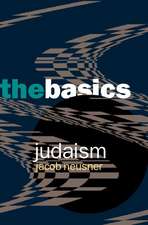The Origins of Jewish Secularization in Eighteenth–Century Europe: Jewish Culture and Contexts
Autor Shmuel Feiner, Chaya Naoren Limba Engleză Hardback – 21 oct 2010
Din seria Jewish Culture and Contexts
-
 Preț: 448.21 lei
Preț: 448.21 lei -
 Preț: 198.22 lei
Preț: 198.22 lei -
 Preț: 285.64 lei
Preț: 285.64 lei -
 Preț: 192.05 lei
Preț: 192.05 lei -
 Preț: 433.78 lei
Preț: 433.78 lei -
 Preț: 237.53 lei
Preț: 237.53 lei - 11%
 Preț: 480.95 lei
Preț: 480.95 lei -
 Preț: 288.94 lei
Preț: 288.94 lei -
 Preț: 244.38 lei
Preț: 244.38 lei -
 Preț: 295.23 lei
Preț: 295.23 lei -
 Preț: 232.70 lei
Preț: 232.70 lei - 11%
 Preț: 449.87 lei
Preț: 449.87 lei -
 Preț: 337.06 lei
Preț: 337.06 lei - 23%
 Preț: 570.97 lei
Preț: 570.97 lei -
 Preț: 469.00 lei
Preț: 469.00 lei -
 Preț: 372.81 lei
Preț: 372.81 lei -
 Preț: 245.25 lei
Preț: 245.25 lei - 11%
 Preț: 570.69 lei
Preț: 570.69 lei - 11%
 Preț: 478.37 lei
Preț: 478.37 lei -
 Preț: 245.25 lei
Preț: 245.25 lei - 11%
 Preț: 440.19 lei
Preț: 440.19 lei -
 Preț: 467.05 lei
Preț: 467.05 lei - 11%
 Preț: 509.01 lei
Preț: 509.01 lei - 11%
 Preț: 443.59 lei
Preț: 443.59 lei - 11%
 Preț: 445.33 lei
Preț: 445.33 lei -
 Preț: 516.53 lei
Preț: 516.53 lei -
 Preț: 406.30 lei
Preț: 406.30 lei - 11%
 Preț: 503.73 lei
Preț: 503.73 lei - 11%
 Preț: 535.02 lei
Preț: 535.02 lei - 11%
 Preț: 470.68 lei
Preț: 470.68 lei - 11%
 Preț: 447.03 lei
Preț: 447.03 lei - 11%
 Preț: 506.29 lei
Preț: 506.29 lei - 11%
 Preț: 502.86 lei
Preț: 502.86 lei -
 Preț: 435.69 lei
Preț: 435.69 lei -
 Preț: 436.67 lei
Preț: 436.67 lei - 11%
 Preț: 448.73 lei
Preț: 448.73 lei - 11%
 Preț: 444.13 lei
Preț: 444.13 lei -
 Preț: 417.84 lei
Preț: 417.84 lei - 11%
 Preț: 440.19 lei
Preț: 440.19 lei - 11%
 Preț: 505.43 lei
Preț: 505.43 lei - 11%
 Preț: 507.99 lei
Preț: 507.99 lei -
 Preț: 438.95 lei
Preț: 438.95 lei - 11%
 Preț: 469.80 lei
Preț: 469.80 lei - 11%
 Preț: 506.29 lei
Preț: 506.29 lei - 11%
 Preț: 447.90 lei
Preț: 447.90 lei - 11%
 Preț: 441.30 lei
Preț: 441.30 lei - 11%
 Preț: 473.52 lei
Preț: 473.52 lei - 11%
 Preț: 501.97 lei
Preț: 501.97 lei -
 Preț: 339.71 lei
Preț: 339.71 lei
Preț: 477.51 lei
Preț vechi: 536.53 lei
-11% Nou
Puncte Express: 716
Preț estimativ în valută:
91.37€ • 95.65$ • 75.60£
91.37€ • 95.65$ • 75.60£
Carte tipărită la comandă
Livrare economică 05-19 aprilie
Preluare comenzi: 021 569.72.76
Specificații
ISBN-13: 9780812242737
ISBN-10: 0812242734
Pagini: 352
Dimensiuni: 165 x 242 x 33 mm
Greutate: 0.7 kg
Editura: MT – University of Pennsylvania Press
Seria Jewish Culture and Contexts
ISBN-10: 0812242734
Pagini: 352
Dimensiuni: 165 x 242 x 33 mm
Greutate: 0.7 kg
Editura: MT – University of Pennsylvania Press
Seria Jewish Culture and Contexts
Cuprins
Preface Introduction: Sins and Doubts -Suspicions Arise -Religion under Attack -Early Jewish Skepticism -Acculturation and Rebellion -Secularization Terminology PART I. LIBERTY AND HERESY, 1700-1760 1 Pleasures and Liberation from Religious Supervision -Insulting the Angels of God -Physical Gratifications 2 Temptations of Fashion and Passion -Life a la Mode: Temptations of the City -Temptations of Eros -Hedonism and Abandoning God 3 The Mystical Sect: Subversive Sabbateans -A New Torah to Permit the Forbidden: From Hayon to Eybeschutz -"I Will Trample on All the Laws": Antinomianism and Libertinism 4 The Rationalist Sect: Neo-Karaites and Deists -Freethinkers and the Threat of Reason -The Fool Says in His Heart That There Is No God: Skepticism and Jewish Identity PART II. A NEW WORLD, 1760-80 5 Providence Is Tested: Secularization on the Rise in the 1760s -Warning Bells Toll in Europe -To Remove the Shackles of the Commandments: Indifference and Laxity -Counterreaction: The Early Maskilim 6 The Supremacy of Nature: Deists on the Margins -A Generation without Religion: The 1770s -From the Second Spinoza to the Biological Epicurean -Religious Skeptics: The "Primitive Ebrew" and the Blasphemer 7 The Emergence of the New World For We Are All Made of Flesh: Fashionable Jews in Amsterdam and Hamburg -The Autonomous Individual: Fanny's and Henriette's Hairstyles PART III. THE OVERTURNED WORLD, 1780-90 8 Scandals and Rebellions -Religious Tolerance and Skepticism in Europe -The Sect of the Wicked Reveals Its Face -Trash Heap of the Ceremonial Laws: The Heterodox in Breslau and Berlin 9 Replacing Mosaic Laws with Laws of Freedom -The Sect of Germans Grows Stronger in Prussia -A Peek into Jewish Life in London -How to Reply to an Epicurean: Fears of Conservatives from Virginia to Lithuania PART IV. ANXIETIES AND CONFRONTATIONS, 1790-1800 10 On the Decline of Judaism: The Last Decade -Between Linitz and London: Irreligion and the Mysteries of Religion -Between Observance and Laxity: Rifts and Tensions -Epicureans on the Offensive: Provocations and Conflicts 11 Soon Our Faith Will Be Lost: Deists and Believers -Falsifications of the Rabbis: Deistic Texts -Transgressions Have Become Permissible: The Counter-War of the Congregation of Believers Summary: Free Jews and the Origins of Secularization Notes Bibliography Index Acknowledgments
Recenzii
"[A] superb study... Feiner lays out a more nuanced and persuasive case for locating the beginning of Jewish secularization in the second half of the 18th century, if not earlier."-Jewish Review of Books "Feiner's contribution to the debate about the origins of Jewish modernity is profound. It is, in my view, the most significant contribution in recent decades to the literature on the decline of tradition prior to the age of political emancipation. Its great achievement is that it enlarges the stage of Jewish history, populating it with a wider cast of characters than has been the rule. It should be obligatory reading for all who wish to understand the forces that transformed European Jewish societies in the eighteenth and nineteenth centuries."-Shofar















